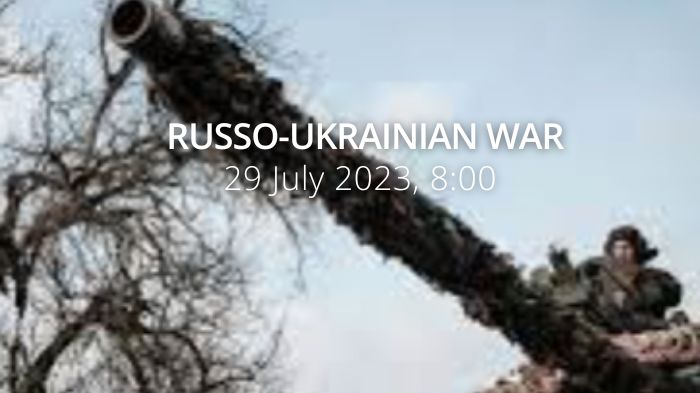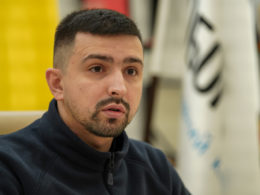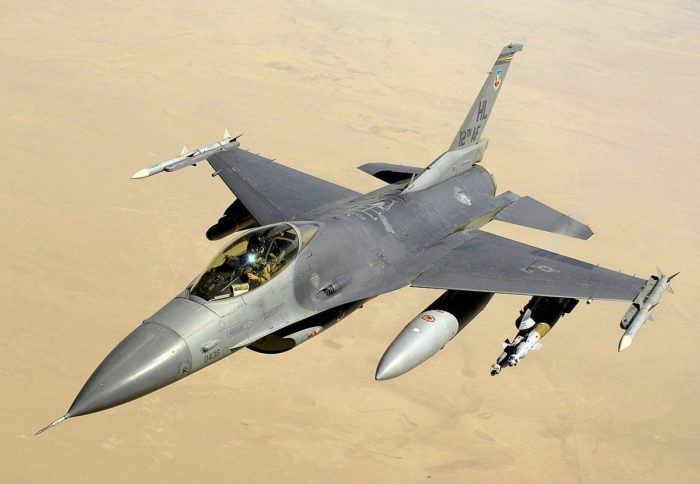US, Russia hold secret talks aimed at ending the war--Moscow Times. Russian forces conducted offensive operations in Donbas and Zaporizhzhia Oblast. Ukraine uses deception to capture Staromaiorske.
Daily overview — Summary report, July 29
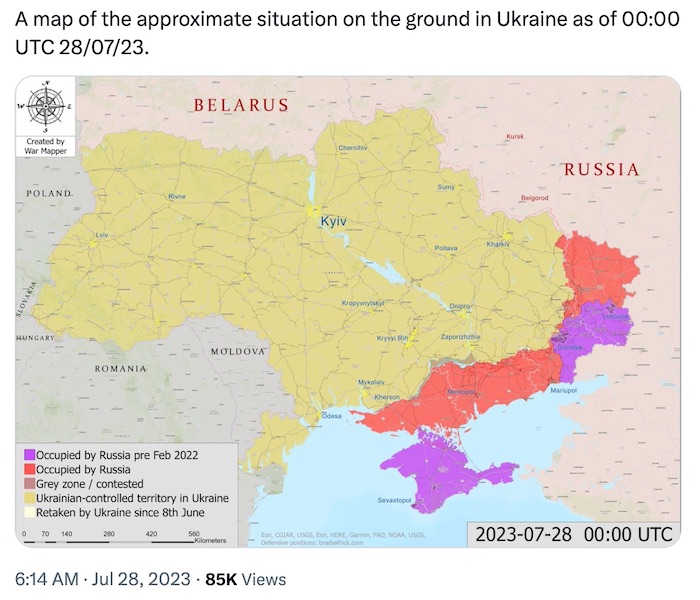
According to information from the General Staff as of 06.00 29.07.2023, supplemented by its [18:00 assessment].


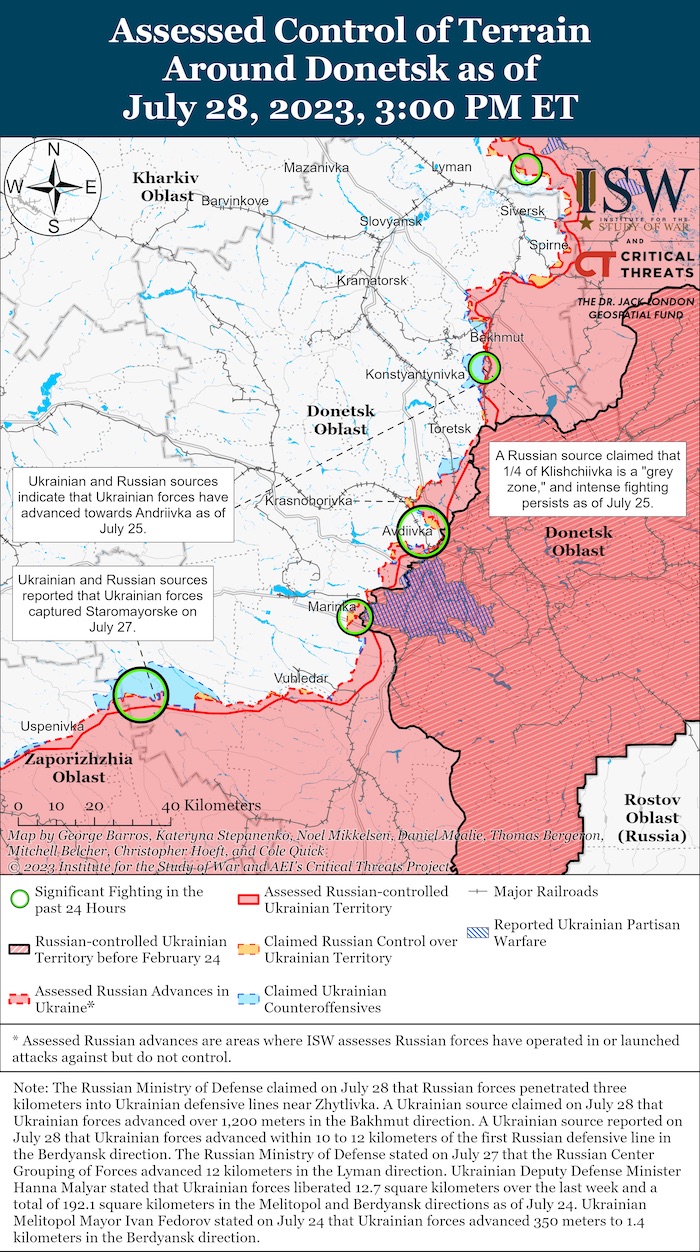

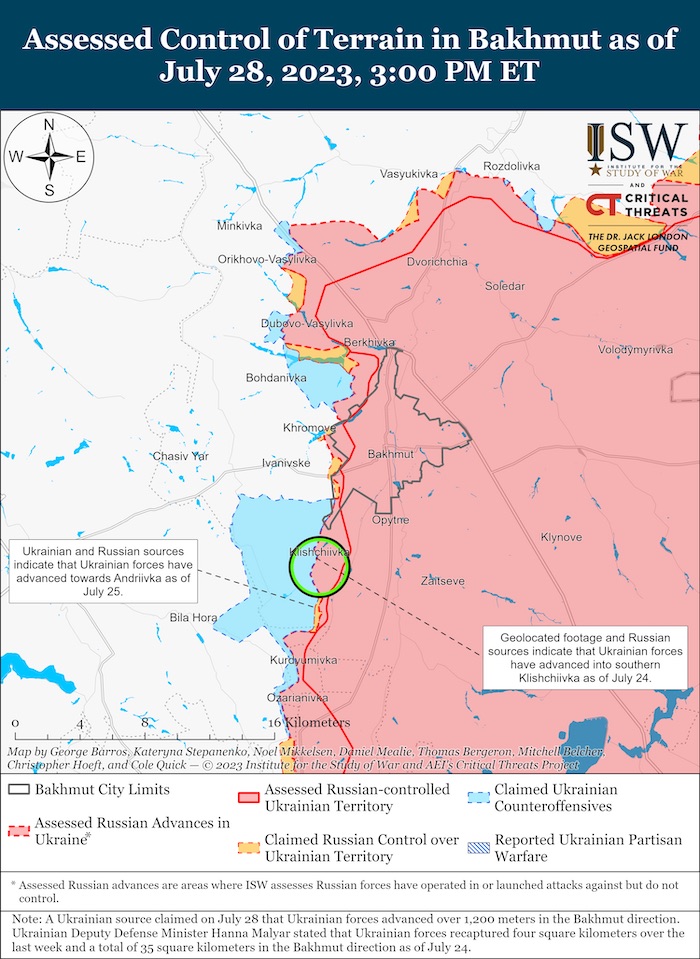
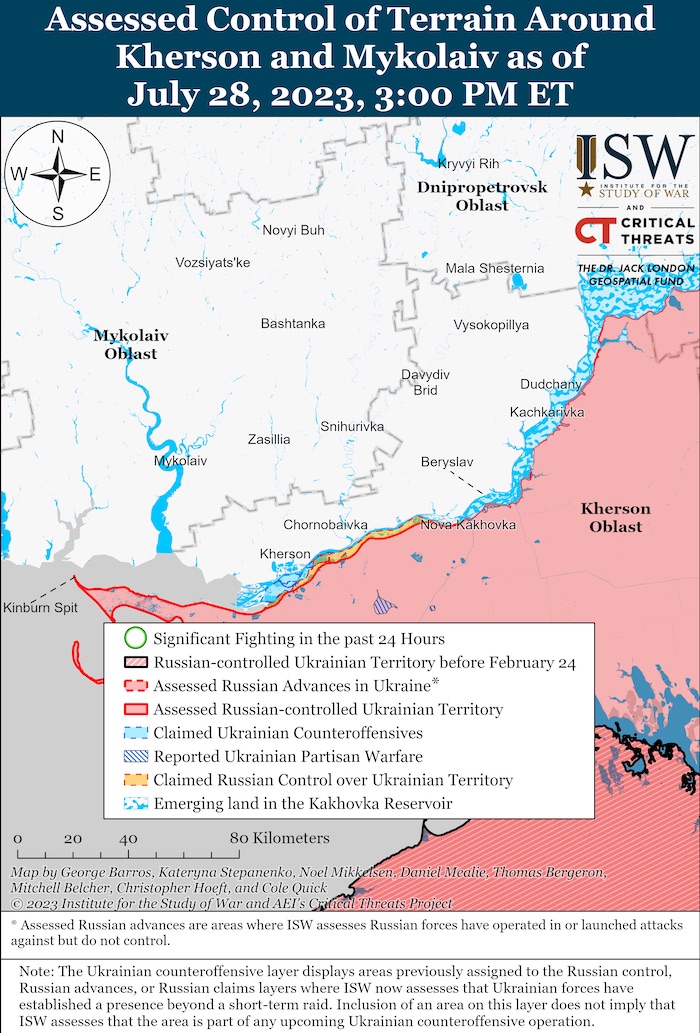
Military Updates
Russia exaggerates Ukrainian losses to portray counteroffensive as flop – ISW. Russian authorities and pro-Kremlin sources are ramping up efforts to falsely characterize Ukraine’s recent counteroffensive operations as unsuccessful, the Institute for Study of War reported in its daily analysis. In remarks on 27 July, President Vladimir Putin claimed Russian forces destroyed nearly 80% of Ukrainian armored vehicles and killed 60% of personnel in recent counterattacks. While not credible, his inflated statistics mark an increase in exaggerating Ukrainian losses.
Frontline report: Ukrainians use deception, trickery to capture Staromaiorske.
Frontline report: Ukrainians use deception, trickery to capture Staromaiorske
According to British Defence Intelligence, (last 48 hours):
- Over the last 48 hours there has been an uptick of fighting in two sectors in southern Ukraine.
- South of Orikhiv, fighting is focused near the village of Robotyne, in the area of responsibility for Russia’s 58th Combined Arms Army.
- Eighty kilometres to the east, Ukrainian forces defeated elements of Russian airborne forces’ (VDV) 247th Guards Air Assault Regiment to capture the village of Staromaiorske.
- Meanwhile, in the north, other VDV units continue offensive operations in the Serebriansk Forest west of Kremina but have achieved little ground.
Losses of the Russian army

Humanitarian
Russian grain handout to Africa can’t replace Ukraine’s disrupted exports – UN chief. UN Secretary-General António Guterres has criticized Russia’s offers to supply dozens of tons of grain to African nations after pulling out of a deal that enabled exports of Ukrainian produce. Speaking to journalists in New York, Guterres said that the UN is making efforts to establish the Black Sea Grain Initiative that allowed to export 30 million tons of Ukrainian grain from its Black Sea ports and that Russia’s “handful of donations to some countries” cannot offset the consequences of the disrupted deal.
Russia’s war in Ukraine will worsen Africa’s food security next two years – British Intel. Russia’s war against Ukraine will exacerbate Africa’s food crisis by disrupting the supplies of Ukrainian grain and ramping up world food prices, the British Defense Intelligence writes in its daily update. “The Russia-Africa Conference convened in St Petersburg on 27 July 2023, with 17 African heads of state attending, down from 43 at the last iteration. The event takes place ten days after Russia withdrew from the Black Sea Grain Initiative (BSGI).
Legal
Explosion in Olenivka prison, which killed at least 50 Ukrainian POWs caused by thermobaric grenade launcher fire – Prosecutor General’s Office. On the night of 29 July 2022, Russian troops used a thermobaric grenade launcher to fire at the Olenivka prison in Donetsk Oblast. At least 50 Ukrainian POWs were killed in the attack, says Ukraine’s Prosecutor General’s Office, as per UkrInform. Currently, the Security Service of Ukraine is conducting an investigation into the violation of customs and laws of war by Russian soldiers in Olenivka.
Ukraine asset declaration bill passes first reading, crucial for IMF aid, EU goals. Ukraine’s Verkhovna Rada passed a bill in its first reading to restart asset declaration requirements for officials, which were suspended after Russia’s invasion. The move comes after calls from G7 ambassadors in February and support from President Volodymyr Zelenskyy for renewing declarations. According to Ukrinform, the law would require officials to file 2021-2022 declarations within 90 days of taking effect. Military personnel in occupied territories or active combat zones would be exempt until returning to duty stations.
Support
Gepard anti-aircraft tanks, Bandvagn vehicles in Germany’s new aid package to Ukraine. Germany has supplied Ukraine with a new military aid package to Ukraine, according to the website of the German Federal Government. It includes six Gepard anti-aircraft tanks and more than 15,000 shells for them, bringing the total number of Gepards, self-propelled anti-aircraft gun systems that combines rapid-fire cannons, radars, and tracking systems to shoot down low-flying enemy aircraft and other aerial threats, supplied to Ukraine to 46. In addition, the package included ten Bandvagn 206 all-terrain vehicles, over 2500 smoke shells, 33 RQ-35 HEIDRUN and VECTOR reconnaissance drones, and eight ambulances.
US aims to deliver Abrams tanks to Ukraine in September – Politico. The United States plans to send Abrams tanks to Ukraine starting in September, Politico reported, citing multiple officials familiar with the discussions. The news marks the clearest timeline to date for delivery of the US main battle tank. Officials say a small number of Abrams will be sent to Germany in August for final refurbishments. Once ready, the first batch of 6-8 tanks will go to Ukraine the following month. In total, the US intends to provide 31 Abrams tanks.
New developments
US, Russian Officials Hold Secret Talks Aimed at Ending Ukraine War. Former senior US national security officials have engaged in confidential discussions with high-ranking Kremlin members in recent months in an effort to find a diplomatic solution to end Russia’s war in Ukraine, a direct participant in the talks has confirmed to The Moscow Times. These confidential talks represent “Track 1.5 diplomacy,” allowing both sides to explore each other’s red lines and defuse possible conflicts. Track 1.5 serves as an important bridge between formal negotiations between governments (track 1) and informal expert discussions (track 2).
Prigozhin secretly woos African leaders at St. Petersburg Forum – ISW. Wagner Group financier Yevgeny Prigozhin engaged with African leaders at the Russia-Africa Economic Forum in St Petersburg on 27 July, a move that analysts from the Institute for Study of War say was likely an effort to position his mercenary group as an alternative to Western partners on the continent. Citing a Russian insider source, the ISW states that Prigozhin did not attend the forum itself but held private, informal meetings with unknown African government representatives at a hotel near the forum. His presence there suggests Wagner wants to maintain significant involvement in Africa amid its lucrative military and mining contracts, the institute analysts say.
Blast in Russia’s Taganrog injures 12 – RFE/RL. On 28 July, a loud blast that occurred as a result of a “missile explosion” hit the Russian city of Taganrog, according to Rostov Governor Vasily Golubev, RFE/RL reported. Local residents said they heard the blast targeted the city center and saw a black cloud of smoke rising over Taganrog. The explosion, which hit the area next to the restaurant “Chekhov’s Sad,” injured at least 12 people, Russian propaganda media outlet TASS reported.
Assessment
- On the War
The Institute for the Study of War has made the following assessment as of 29 July:
Ukrainian forces conducted counteroffensive operations in at least three sectors of the front and reportedly advanced near Bakhmut on July 28. Ukrainian military officials stated that Ukrainian forces continued counteroffensive operations on the northern and southern flanks of Bakhmut, and Ukrainian Deputy Defense Minister Hanna Maliar stated on July 27 that Ukrainian forces continued advancing south of Bakhmut.[1] A Russian milblogger claimed on July 28 that Ukrainian forces advanced near Kurdyumivka and Andriivka.[2] Russian milbloggers claimed that Ukrainian forces continued ground attacks along the Donetsk-Zaporizhzhia Oblast border near Staromayorske (9km south of Velyka Novosilka) and Urozhaine (9km south of Velyka Novosilka), and some milbloggers acknowledged that Ukrainian forces captured Staromayorske on July 27.[3] A Ukrainian source claimed that Ukrainian forces have advanced to within 10-12 kilometers of the main Russian defensive line in the Berdiansk direction.[4] Russian milbloggers claimed that Russian forces repelled Ukrainian ground attacks near Robotyne (10km south of Orikhiv), Verbove (17km southeast of Orikhiv), and Pyatykhatky (25km southwest of Orikhiv) in western Zaporizhzhia Oblast.[5] Russian “Vostok” Battalion Commander Alexander Khodakovsky stated that Ukrainian forces can conduct strikes against the full depth of defending Russian forces and that these strikes are killing Russian commanders and degrading Russian command and control.[6] The Ukrainian General Staff reported that the 247th Guards Air Assault (VDV) Regiment (7th VDV Division) refused to go to combat near Staromayorske due to heavy Russian losses and Ukrainian battlefield victories.[7]
Russian naval posturing in the Black Sea likely aims to impose a de facto blockade on Ukrainian ports without committing the Black Sea Fleet to the enforcement of a naval blockade.
Ukrainian Southern Operational Command Spokesperson Captain First Rank Nataliya Humenyuk reported on July 28 that Ukrainian officials have intercepted radio transmissions of Russian forces warning civilian ships in the Black Sea against heading to Ukrainian ports.[8] A Russian milblogger amplified an audio recording purportedly of a Russian warship telling a civilian vessel in the Black Sea that Russian forces would consider the vessel involved in the conflict in Ukraine as a military cargo ship if it sailed towards a Ukrainian port.[9] Russian sources also claimed that Russian authorities announced a nighttime navigation ban for all small vessels near the Kerch Strait due to concerns about Ukrainian naval drones.[10] The Black Sea Fleet conducted exercises on July 27 wherein naval warships launched a missile at a target ship in the Black Sea.[11] The Russian Foreign Ministry (MFA) recently attempted to soften the Russian Ministry of Defense’s (MoD) July 19 announcement about viewing civilian ships in the Black Sea as legitimate military targets by claiming that the announcement meant that Russian forces would inspect ships.[12] The Russian MoD itself has not clarified what actions its announcement will allow the Russian military to take and even the Russian MFA’s interpretation would require Russian forces to board and possibly seize foreign civilian vessels. The Russian naval posturing in the Black Sea is likely intentionally ambiguous to generate widespread concern about possible detention by the Russian navy or outright strikes on civilian vessels. The Kremlin likely aims for this posturing to have a chilling effect on maritime activity so that Russian naval assets do not need to enforce an actual blockade of Ukrainian ports. A naval blockade is only mandatory for neutral entities to follow under international law if a belligerent declares the existence of the blockade, and Russia has yet to do so.[13]
Russian President Vladimir Putin attempted to reassure African partner states that Russia will maintain its economic and security commitments during the second day of the Russia-Africa Summit in St. Petersburg. Putin addressed African heads of state and representatives at the summit’s plenary session on July 28 and highlighted military-technical agreements with 40 African countries and plans to expand Russia’s diplomatic presence in Africa.[14] Putin stated that Russia aims to help train African partners‘ military and law enforcement personnel and noted that there are many African personnel at the Russian Ministry of Defense (MoD) academy.[15] Putin also claimed that between 2022 and 2023 Russia wrote off $23 billion of debt for African countries.[16] Putin claimed that Russia has sent almost 10 million tons of grain to African countries so far in 2023 and reiterated a pledge to send 25,000 to 50,000 tons of grain to six African countries in the next three to four months free of charge.[17] Putin pointedly stated that Russia will always be a responsible international supplier of agricultural products, likely aiming to reassure African partners concerned about food security following Russia’s withdrawal from the Black Sea Grain Initiative.[18]
African Union Commission Chair Moussa Faki Mahamat stated at the summit that disruptions to energy and grain supplies must end, and both Mahamat and Egyptian President Abdel Fattah al-Sissi explicitly called for the revival of the grain deal.[19] Al-Sissi also promoted a Kremlin talking point that Russia quit the grain deal because the grain corridor was not facilitating grain shipments to the poorest of countries, even though Putin himself cited Russian producers’ losses at depressed grain prices as a primary reason for leaving the deal.[20] African countries are likely appealing to Russia without fully backing its position concerning the grain deal in hopes of retaining Russian economic and security commitments, in line with their likely primary objective to mitigate the economic fallout from the war in Ukraine affecting their economies.[21]
The Kremlin continues to display little interest in an unspecific peace plan focused on eliminating disruptions to international trade proposed by African heads of state. Congolese President Denis Sassou Nguesso, Senegalese President Macky Sall, South African President Cyril Ramaphosa, and Mahamat all appealed to Putin to consider a negotiated settlement to the war in Ukraine.[22] A delegation representing seven African states proposed a generalized peace plan focused on resuming international trade to Putin on June 17.[23] Putin responded to renewed calls to engage with this peace plan at the summit by stating that Russia is respectfully and carefully considering the proposal.[24] Putin has yet to address the feasibility of the peace plan and instead reiterated boilerplate rhetoric that Ukraine and the West are preventing negotiations from taking place.[25] The Kremlin is likely trying to portray itself as considering the peace plan to promote ongoing Russian information operations that feign interest in a negotiated settlement while aiming to slow Western security assistance to Ukraine.[26] The Kremlin is also likely using the proposal to pursue strengthened bilateral and multilateral engagement with African states as part of an overall effort to present itself as a more attractive ally than the collective West.[27] The Kremlin has not demonstrated any intent to engage with any peace process meaningfully.
Russian authorities may be increasingly concerned about how the Russian electorate views the war ahead of regional elections in September 2023 and the Russian presidential election in 2024. A Russian insider source and independent Russian opposition news outlet Verstka both claimed that the Russian Ministry of Defense’s (MoD) initiative to increase the maximum conscription age from 27 to 30 years old caused a heated discussion among Kremlin officials.[28] The sources claimed that the Russian Security Council urged the Presidential Administration not to support the MoD’s initiative over concern that the initiative would cause public backlash and affect Russian President Vladimir Putin’s approval ratings.[29] The sources reported that Russian Defense Minister Sergei Shoigu pushed the initiative through and maintained Putin’s support, despite the Security Council’s concerns.[30] Verstka claimed that Putin supported the MoD’s initiative after listening to Shoigu‘s arguments about the shortage of soldiers in Ukraine.[31] Verstka also reported that sources stated that United Russia officials are afraid to use the war in Ukraine in their election campaigns in upcoming regional and local elections because they are concerned about how voters will react to it.[32] Verstka‘s sources claimed that United Russia intends to highlight and appeal to local issues instead of highlighting the war in Ukraine. Verstka claimed that it has reviewed United Russia’s election materials and stated that the war is not a main theme.[33] The concern among elements of the Kremlin and United Russia indicates concern over domestic support for the war and fears that the Kremlin’s perceived electoral legitimacy could weaken in upcoming elections - though to be sure this loss of support primarily presents United Russia with a greater need to falsify election results and the possibility of local losses to other “managed opposition” parties, not a legitimate threat to its dominance of Russian politics.
Politico reported that the first batch of refurbished US Abrams tanks will likely arrive in Ukraine in September. Politico cited six US officials as saying that the US plans to deliver six to eight Abrams (two platoons) to Germany in August for refurbishment before shipping the tanks to Ukraine in September and that the US will send a total of 31 Abrams (roughly an understrength armored battalion, at most one-third of a full Ukrainian brigade) to Ukraine.[34]
Key Takeaways:
- Ukrainian forces conducted counteroffensive operations in at least three sectors of the front and reportedly advanced near Bakhmut on July 28.
- Russian naval posturing in the Black Sea likely aims to impose a de facto blockade on Ukrainian ports without committing the Black Sea Fleet to the enforcement of a naval blockade.
- Russian President Vladimir Putin attempted to reassure African partner states that Russia will maintain its economic and security commitments during the second day of the Russia-Africa Summit in St. Petersburg.
- The Kremlin continues to display little interest in an unspecific peace plan focused on eliminating disruptions to international trade proposed by African heads of state.
- Russian authorities may be increasingly concerned about how the Russian electorate views the war ahead of regional elections in September 2023 and the Russian presidential election in 2024.
- Politico reported that the first batch of refurbished US Abrams tanks will likely arrive in Ukraine in September.
- Russian forces conducted offensive operations along the Svatove-Kreminna line, near Bakhmut, and in the Donetsk-Zaporizhzhia Oblast border area on July 28 and made advances in certain areas.
- Ukrainian forces continued counteroffensive operations on at least three sectors of the front on July 28 and have reportedly advanced along the Svatove-Kreminna line, near Bakhmut, and along the Donetsk-Zaporizhzhia Oblast border.
- The Russian Federation Council approved measures allowing the Russian National Guard (Rosgvardia) to receive heavy military equipment and increasing the upper limit of the conscription age range from 27 years old to 30 years old.
- Russian authorities continue to deport Ukrainian teenagers to Russia under the guise of summer camp programs.

